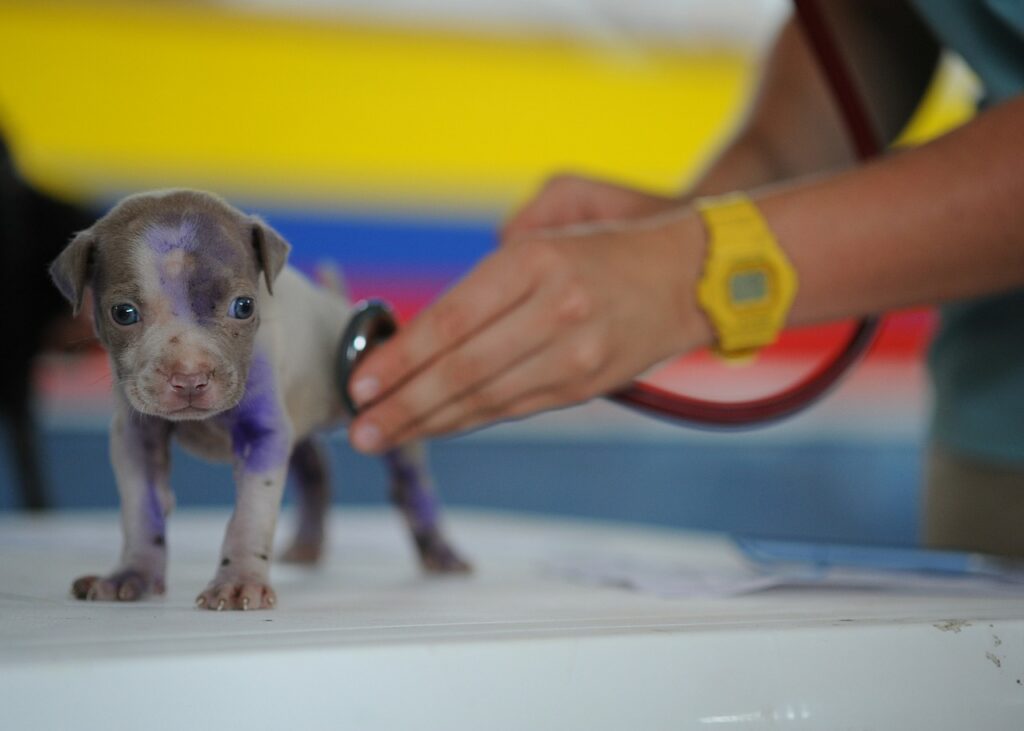Fleas can be harmful to your dog. They don’t just lead to bites and wounds. They can also lead to more serious conditions, such as flea anemia. Thankfully, there are flea treatments out there that effectively get rid of these bloodsuckers. However, flea treatment poisoning in dogs is a real thing. What is it, and what can you do about it?
Dog flea treatment poisoning — fast facts
- Flea treatments contain chemicals that can cause poisoning. Flea treatments are meant to kill fleas, pupae, larvae, and eggs. It’s not surprising that they have strong ingredients that can be detrimental to your dog too. Flea treatments can contain pyrethrin, pyrethroids, and other ingredients that can cause poisoning. Your dog doesn’t even have to ingest the stuff to experience poisoning. This is because your dog can absorb these toxic ingredients through their skin and into their bloodstream. After all, not all dog flea treatments are taken orally. Some are applied topically.
- Flea treatment poisoning in dogs results in a variety of symptoms. Exposure to these toxic chemicals can lead to poisoning. Depending on the flea treatment used, the level of exposure, and your dog’s general health, your dog can experience a variety of symptoms. The most common symptoms involve the skin, such as irritation and redness. Other symptoms involve digestion, like diarrhea and vomiting. And some of the most alarming ones are neurological, such as seizures and tremors.
- Improper use of dog flea treatments is one of the most common causes of poisoning. Yes, you can get rid of fleas using over-the-counter dog flea treatments. But it’s still better to consult a veterinarian. If you try to treat your dog’s fleas yourself, a lot of things can go wrong. You can use an entirely wrong medication, putting your dog in unnecessary danger. You can give too much of the treatment to your dog, leading to overdosing and poisoning. And you can become overconfident and just use the treatment without reading instructions.

What to do in case of dog flea treatment poisoning
- Contact your veterinarian immediately. If you suspect your dog to be experiencing flea treatment poisoning, seek emergency veterinary care as soon as you can. Severe and untreated cases of flea treatment poisoning in dogs can be fatal. Even though these are rare, you don’t want to take chances. Most of the time, dogs can manage and fully recover from flea treatment poisoning. You just have to get medical professionals involved.
- Prepare all necessary information to help the veterinarian make decisions. When you are bringing your dog to a veterinarian, bring the flea treatment you have been using, together with its packaging. This will help the veterinarian make more informed decisions in treating your pet. Also, inform the veterinarian of your pet’s medical history and current medical condition. For example, if your dog is pregnant or you know that it is sensitive to certain medications, you should share that information with the medical professional. It also helps to share your dog’s age, weight, and overall health condition.
- Monitor your dog and inform your veterinarian of any concerns. Depending on the veterinarian’s findings, your dog can receive outpatient treatment or become hospitalized. If your dog is an outpatient, you will have to monitor your dog yourself. You know your dog more than anyone. If you see suspicious changes in its behavior or physical body, you will have to inform your veterinarian, just in case the changes are something you should really be concerned about.

How to prevent poisoning while treating dog fleas
- Consult a veterinarian to know the proper flea treatment for your dog. You can get rid of dog fleas yourself with over-the-counter dog flea treatments. But even with the use of effective commercial products, treating dog fleas yourself can be complex. You have to determine the right products to use and know how to use these products properly. You may think that this is cost-effective. But when things go wrong, it may even cost you more because of the medical bills that will pile up because of an inaccurate diagnosis, the misuse of the products, or an incomplete treatment plan. Avoid these complexities and stay safe by getting help from a licensed medical professional.
- Read and follow instructions diligently. There are many kinds of flea treatments you can try out there. You have flea collars, which are chemical-rich collars that you put on your dog. You have flea sprays and spot-on treatments, which are chemicals you apply directly to your dog’s fur and skin. And you have flea shampoos, which are chemicals you lather and apply to your dog during a bath. They have different instructions on how to use them properly and safely. Make sure to read them and follow them diligently. This can minimize the risk of flea treatment poisoning in your dog.
- Separate your dog from other pets. There are known cases of pet groomers getting sick because of flea treatment exposure. These are humans that follow safety procedures and protocols. And even then, they are not completely safe. Your other pets are in an even worse position. They are smaller than humans. They would need a significantly lower amount of exposure to get sick themselves. It’s wise to separate your dog from your other pets while it’s undergoing flea treatment to protect your other pets from poisoning.
Flea treatment poisoning can be dangerous for dogs
Dog flea treatments contain toxic chemicals like pyrethrins and pyrethroids. This makes your dog vulnerable to flea treatment poisoning, especially if you don’t use the dog flea treatments properly. Some of the symptoms you should look out for include diarrhea, seizures, skin irritation and redness, tremors, and vomiting.
If you think your dog has been poisoned because of flea treatments, take it to the veterinarian immediately to receive emergency care. In most cases, pets make a full recovery. But there are severe and untreated cases that can become fatal. This just highlights the importance of consulting a veterinarian, not just in curing flea treatment poisoning in dogs, but also treating dog fleas in general.

